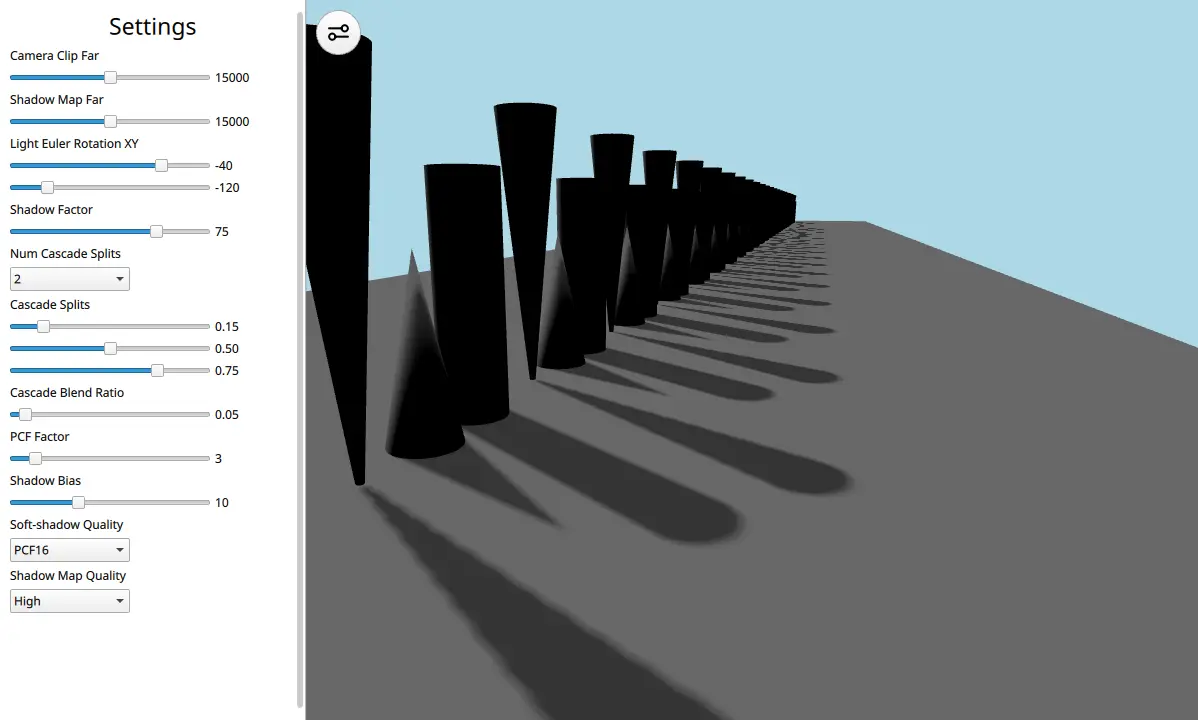Qt Quick 3D - Cascaded Shadow Maps Example
Demonstrates cascaded shadow maps.

This example demonstrates how to use a DirectionalLight with cascaded shadow maps.
Let's have a look at the scene's QML code:
View3D {
id: view
x: settings.viewX
y: 0
width: parent.width - settings.viewX
height: parent.height
camera: camera
environment: SceneEnvironment {
clearColor: "lightblue"
backgroundMode: SceneEnvironment.Color
antialiasingMode: SceneEnvironment.MSAA
antialiasingQuality: SceneEnvironment.High
}
PerspectiveCamera {
id: camera
position: Qt.vector3d(458, 300, 515)
eulerRotation: Qt.vector3d(-14, 19, 0)
clipFar: settings.clipFar
}
DirectionalLight {
visible: true
castsShadow: true
shadowFactor: settings.shadowFactor
eulerRotation: settings.eulerRotation
csmSplit1: settings.csmSplit1
csmSplit2: settings.csmSplit2
csmSplit3: settings.csmSplit3
csmNumSplits: settings.csmNumSplits
shadowMapQuality: settings.shadowMapQuality
csmBlendRatio: settings.csmBlendRatio
shadowBias: settings.shadowBias
pcfFactor: settings.pcfFactor
softShadowQuality: settings.softShadowQuality
shadowMapFar: settings.shadowMapFar
lockShadowmapTexels: settings.lockShadowmapTexels
}
Model {
id: ground
source: "#Cube"
scale: Qt.vector3d(25, 0.01, 135)
z: -5500
materials: PrincipledMaterial {
baseColor: "gray"
}
castsShadows: false
}
Node {
id: shapeSpawner
Component.onCompleted: {
var conesAndCylinderTrio = Qt.createComponent("ConesAndCylinderTrio.qml")
var z_pos = 0
for (var i = 0; i < 25; i++) {
conesAndCylinderTrio.incubateObject(shapeSpawner, {
"z_positions": [
z_pos,
z_pos - 125,
z_pos - 250
]})
z_pos -= 450
}
}
}
MouseArea {
anchors.fill: parent
acceptedButtons: Qt.LeftButton
propagateComposedEvents: true
onClicked: {
settings.drawerVisible = false
wasd.forceActiveFocus() // focus WASD controller for keyboard input
}
}
}The scene consists of a DirectionalLight, a PerspectiveCamera, a floor Model, and a long array of cones and cylinder Models. This long array is laid out like this to show how cascades can help increase the graphical fidelity of the scene. With just one shadow map it will cause artifacts but with cascades these can be remedied. The DirectionalLight contains a lot of properties that are tweakable through a settings pane in the UI.
The reader is encouraged to see the Shadow Mapping article for more information on the different properties and to try out the example to see how they interact.
© 2026 The Qt Company Ltd. Documentation contributions included herein are the copyrights of their respective owners. The documentation provided herein is licensed under the terms of the GNU Free Documentation License version 1.3 as published by the Free Software Foundation. Qt and respective logos are trademarks of The Qt Company Ltd. in Finland and/or other countries worldwide. All other trademarks are property of their respective owners.

